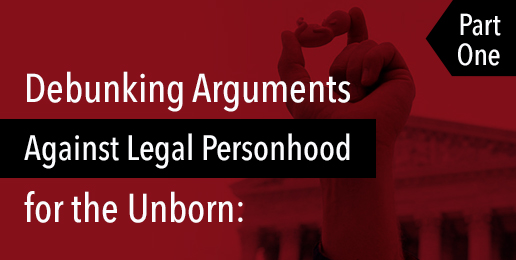
For all that Dobbs did for the fight for life, there’s one issue that it conspicuously avoided—whether the unborn are in fact human persons. Dobbs repeatedly made reference to supposed “fetal life,” but refused to claim that this fetal life was the life of a person and thus entitled to protection.
This is supremely unfortunate, because the personhood of the unborn is the core claim of the pro-life movement. Yes, we can be thankful (in certain ways) that Dobbs sent the abortion controversy back to the people—at least that’s better than abortion being nationally mandated.
However, we should ultimately strive for a day when the personhood of the unborn is not even left to popular consensus. If abortion is decided by the opinions of the people, then we’re still living in a “pro-choice” world—just with voters making the choices instead of mothers.
On the contrary, I stand that the value of human life is not based on a choice made by anyone. It is rooted in God’s gift of life and in His image which He has imprinted into it.
For this reason, I support the idea of a personhood amendment to the U.S. Constitution, and I applaud the work of legal thinkers who have fleshed out arguments for it and responded to objections lodged against it.
Enshrining the status of the unborn in our founding document would be the closest we could get to immutably ensuring their protection. And it would make a lot of sense, too, because the Constitution’s 14th Amendment is the whole reason the personhood debate matters.
However, not everyone agrees on this. Understandably, the pro-abortion side balks at how extreme and far-reaching a personhood amendment would be. So I’d like to add my thoughts to this debate through some argument-by-argument responses to an article that appeared in Time right after Dobbs.
The article anticipated that personhood laws would be a logical next move for pro-lifers, and so the author articulated several different objections that critics raise against the idea. Let’s look at these one by one.
Critics of fetal personhood laws argue the state cannot bestow legal rights onto a fetus or embryo without subjugating the rights of the pregnant person.
That’s an odd claim to start off with. Shouldn’t the debate about unborn personhood center on the nature of the unborn? Why is the opening criticism about other people’s rights? Imagine a newspaper during the Civil Rights movement reporting this claim:
“Critics of civil rights laws argue that the state cannot bestow legal rights onto black people without subjugating the rights of white people.”
Why don’t we discuss whether black people really are equal human persons? Because if they are, of course white people will have to act differently around them. Likewise, if the unborn really were people, then of course other people’s rights respecting them would be limited in certain ways.
The rights you enjoy depend on your nature, not on what other people may or may not be able to do because of your status.
In theory, fetal personhood laws could impact the use of in vitro fertilization (IVF) . . . A round of IVF can create multiple embryos, which can be frozen indefinitely.
Yes. Exactly. Time is supremely insightful at this point—I wish more pro-lifers were just as insightful. If you are pro-life because you believe that preborn humans are persons from the moment of conception, then of course you must believe that surplus-fertilization-IVF is sinful.
Less than half of all embryos “conceived” are brought to a live birth—and any elective medical procedure that involves freezing and storing people is inherently wrong. I wish that the people taking strong stands against abortion would take equally strong stands against IVF when it creates such “surplus life.”
As a pro-lifer, to back down on IVF is logically inconsistent and morally reprehensible.
There are several more arguments from this article that need to be addressed.
Please take a look at part 2.
*Note: As originally published, this article made a general claim about all IVF procedures. It has since been edited to specifically critique those that create more embryos than will be brought to the fullness of life.























